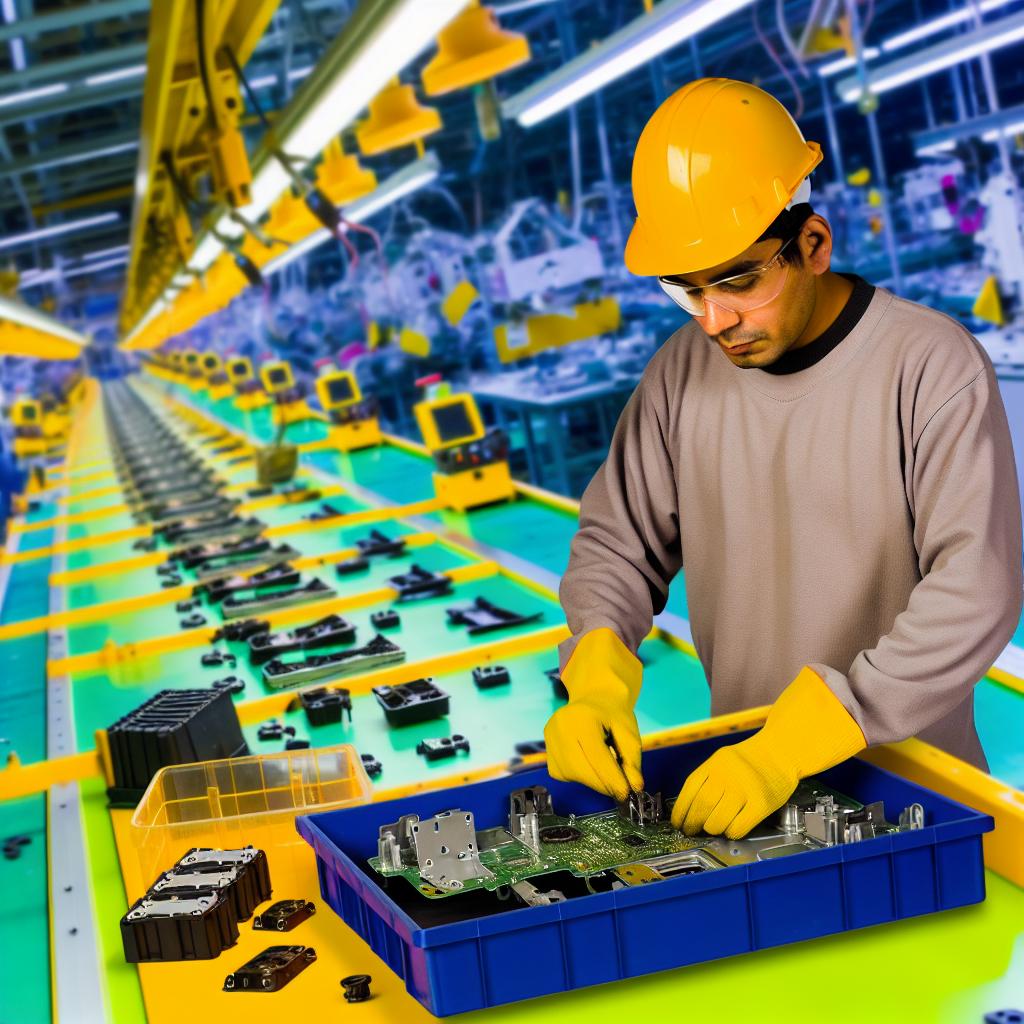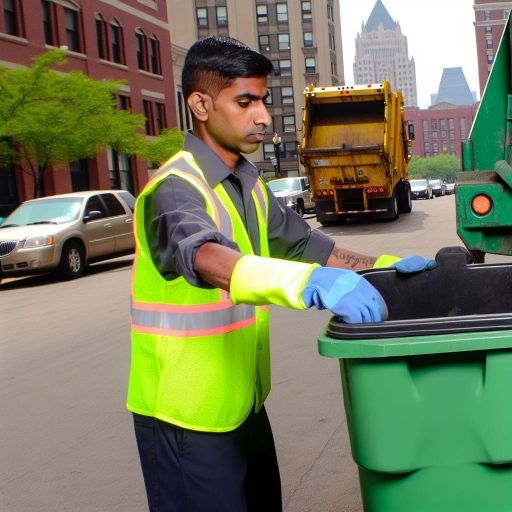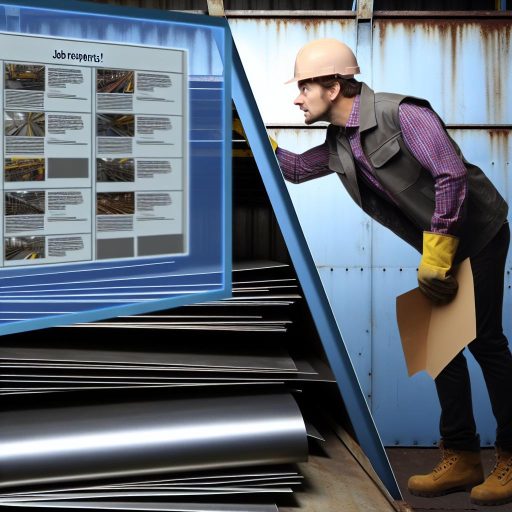Importance of Assembly Jobs in the Economy
Assembly jobs contribute significantly to the economy by providing employment opportunities for individuals across various skill levels.
These jobs help boost local economies and support other industries by creating demand for goods and services.
The Future of Assembly Jobs in the USA
As we look ahead, the future of assembly jobs in the USA is facing significant changes.
With advancements in technology, automation is becoming more prevalent in manufacturing.
This shift will likely lead to a decrease in traditional assembly jobs as machines take over repetitive tasks.
However, this transformation also presents new opportunities for skilled workers.
As automation increases, the demand for individuals with technical expertise to operate and maintain the machinery will rise.
Additionally, there will be a greater emphasis on training programs to prepare workers for these high-tech manufacturing roles.
While the landscape of assembly jobs in the USA may be evolving, the industry will continue to play a crucial role in the economy.
Adapting to these changes will be essential for both businesses and workers to thrive in the future.
Current Status of Assembly Jobs:
Assembly jobs have been an integral part of the US economy for decades.
These jobs involve putting together components or products to create a finished product.
Currently, there are approximately 2.5 million assembly jobs in the USA.
Statistics on Assembly Jobs in the USA:
The manufacturing industry is one of the main sectors that heavily relies on assembly jobs.
This industry employs a significant portion of the workforce in the country.
According to recent statistics, around 30% of assembly jobs are in the manufacturing sector.
Overview of Industries that Rely on Assembly Jobs:
Other industries that heavily rely on assembly jobs include the automotive industry, electronics industry, and appliance manufacturing.
These industries require skilled workers to assemble their products efficiently and effectively.
Impact of Technology and Automation on Assembly Jobs:
Advancements in technology and automation have significantly impacted assembly jobs in the USA.
Many companies are now using robots and automated machinery to streamline their assembly processes.
Transform Your Career Today
Unlock a personalized career strategy that drives real results. Get tailored advice and a roadmap designed just for you.
Start NowWhile this has increased efficiency, it has also led to a decline in the demand for human assembly workers.
As technology continues to advance, there is a growing concern about the future of assembly jobs in the USA.
Many fear that automation will lead to further job losses in this sector.
However, some experts believe that there will still be a need for human workers in certain aspects of assembly that require a high level of skill and precision.
Challenges Facing Assembly Jobs:
- Global competition and outsourcing
- Impact of trade policies on Assembly Jobs
- Shift towards skilled labor and specialized manufacturing processes
Global competition has significantly impacted the landscape of assembly jobs in the USA.
With advancements in technology and transportation, companies now have the freedom to outsource their manufacturing processes to countries where labor costs are significantly lower.
This has led to a decline in the number of assembly jobs available in the USA, as companies seek cost-effective solutions to remain competitive in the global market.
Trade policies play a crucial role in shaping the future of assembly jobs in the USA.
Changes in trade agreements and tariffs can have a direct impact on the demand for products manufactured in the country.
Uncertainty surrounding trade policies can make it challenging for companies to make long-term investment decisions, leading to hesitation in creating new assembly jobs or expanding existing operations.
Another challenge facing assembly jobs is the shift towards skilled labor and specialized manufacturing processes.
As automation and robotics continue to revolutionize the manufacturing industry, the need for highly skilled workers who can operate and maintain complex machinery is on the rise.
This shift towards specialized manufacturing processes has created a skills gap, as traditional assembly line workers may not have the necessary training to adapt to the changing demands of the industry.
It is crucial for companies to adapt to these changing dynamics by investing in innovative technologies, upskilling their workforce, and advocating for policies that support a thriving manufacturing sector in the country.
Learn More: The Importance of Attention to Detail for Assemblers
Opportunities for Growth in Assembly Jobs:
Emerging industries may create more assembly jobs.
The renewable energy sector is booming.
This growth leads to solar panel and wind turbine assembly jobs.
Advanced manufacturing like 3D printing is evolving.
Robotics will require skilled assembly workers.
Transform Your Career Today
Unlock a personalized career strategy that drives real results. Get tailored advice and a roadmap designed just for you.
Start NowBiotechnology companies need assembly workers.
They work on medical devices and equipment.
Government initiatives are promoting manufacturing.
Tax incentives support companies creating assembly jobs in the USA.
Funding is available for training programs.
These programs aim to upskill workers for assembly jobs.
Trade policies prioritize domestic manufacturing.
Reshoring could bring back jobs to the USA.
Rising labor costs in China make US assembly jobs competitive.
Advances in automation reduce the need for cheap overseas labor.
Consumer demand favors products made in the USA.
Explore Further: Essential Skills Every Professional Janitor Should Have
Skills Needed for Future Assembly Jobs:
As the landscape of assembly jobs in the USA continues to evolve, it has become increasingly important for workers to possess a diverse set of skills to thrive in the industry.
In this section, we will delve into the specific skills needed for future assembly jobs and the strategies to bridge the skills gap.
Analysis of Current Skills Gaps
The assembly industry is constantly changing due to advancements in technology and automation.
As a result, there are existing skills gaps that need to be addressed to meet the demands of the future workforce.
Some of the key areas where gaps have been identified include:
- Problem-solving skills
- Technical skills in operating machinery
- Quality control and assurance
- Communication and teamwork
Employers are seeking candidates who can adapt to new challenges and think critically to troubleshoot issues that may arise during the assembly process.
As automation continues to play a significant role in assembly jobs, workers need to have a solid foundation in operating and maintaining machinery to remain competitive in the industry.
Importance of Technical Skills and Adaptability
Technical skills are a cornerstone of success in the assembly industry.
Transform Your Career Today
Unlock a personalized career strategy that drives real results. Get tailored advice and a roadmap designed just for you.
Start NowWorkers must have a deep understanding of the machinery and tools they are working with to ensure efficiency and accuracy in the production process.
Additionally, with the rise of automation, workers need to be adaptable and open to learning new technologies to stay relevant in the field.
Employers are looking for candidates who can quickly adapt to changes and are willing to undergo continuous training to enhance their skills.
The ability to learn new technologies and techniques will set workers apart in a competitive job market and increase their employability in the long run.
Discussion on the Role of Education and Training Programs
Education and training programs play a crucial role in preparing workers for future assembly jobs.
These programs provide hands-on experience and theoretical knowledge that are essential for success in the industry.
They also help bridge the skills gap by offering specialized training in areas such as:
- Mechanical engineering
- Industrial automation
- Quality assurance
- Lean manufacturing
By investing in education and training programs, workers can acquire the necessary skills to excel in their roles and contribute effectively to the assembly process.
Additionally, these programs offer opportunities for career advancement and specialization, allowing workers to stay competitive and up-to-date with industry trends.
The future of assembly jobs in the USA hinges on the skills and adaptability of its workforce.
By addressing current skills gaps, emphasizing the importance of technical skills, and investing in education and training programs, workers can secure their positions in the evolving landscape of the assembly industry.
You Might Also Like: Environmental Impact of Sheet Metal Fabrication
Innovation plays a crucial role in shaping the future of assembly jobs in the USA.
Let’s explore the impact of innovation on assembly jobs:
Introduction of new technologies
- New technologies such as robotics and 3D printing are revolutionizing the assembly industry.
- These technologies improve efficiency, precision, and speed of production processes.
- Automation reduces the need for manual labor in assembly lines, leading to a shift in job requirements.
Creating new job opportunities
- Innovation not only eliminates some assembly jobs but also creates new job opportunities.
- Roles like robot programming, maintenance of automated systems, and quality control are in demand.
- Skilled workers with expertise in operating and troubleshooting advanced machinery are highly sought after.
Challenges of upskilling workers
- One of the major challenges is upskilling existing workers to adapt to new technologies.
- Training programs are essential to equip employees with the necessary skills for advanced roles.
- Companies need to invest in continuous training and development to ensure a skilled workforce.
While innovation brings about significant changes in assembly jobs, it also presents opportunities for growth and advancement.
Adapting to new technologies is key to thriving in the evolving landscape of assembly work.
Delve into the Subject: The Role of Boilermakers in Sustainable Energy

Sustainability and Assembly Jobs:
In today’s rapidly changing world, sustainability has become a key focus for many industries, including manufacturing.
As consumers become more environmentally conscious, companies are under pressure to adopt sustainable practices throughout their operations, including assembly jobs.
Increasing Focus on Sustainable Manufacturing Practices:
- Companies are increasingly recognizing the importance of sustainable manufacturing practices to reduce their carbon footprint and minimize environmental impact.
- Reducing waste, optimizing energy usage, and using eco-friendly materials are now becoming standard practices in the manufacturing sector.
- Implementing sustainable practices in assembly jobs not only benefits the environment but also improves operational efficiency and cost-effectiveness.
Opportunities for Green Assembly Jobs:
- With the growing emphasis on sustainability, there is a rising demand for green assembly jobs that involve incorporating eco-friendly practices into the production process.
- Green assembly jobs may include roles such as recycling specialists, energy efficiency engineers, and waste reduction managers.
- Workers with skills in sustainable manufacturing practices are increasingly sought after by companies looking to enhance their green credentials.
Importance of Environmental Regulations in Shaping the Future of Assembly Jobs:
- Environmental regulations play a crucial role in shaping the future of assembly jobs by setting standards and guidelines for sustainable manufacturing practices.
- Compliance with environmental regulations is not only a legal requirement but also essential for maintaining a positive corporate image and meeting consumer expectations.
- Companies that fail to adhere to environmental regulations risk facing fines, legal action, and reputational damage, highlighting the importance of prioritizing sustainability in assembly jobs.
The future of assembly jobs in the USA is closely linked to sustainability and environmental responsibility.
Transform Your Career Today
Unlock a personalized career strategy that drives real results. Get tailored advice and a roadmap designed just for you.
Start NowBy embracing sustainable manufacturing practices, companies can not only reduce their environmental impact but also create opportunities for green assembly jobs and contribute to a more eco-friendly future.
Role of Government Policies:
Government policies play a crucial role in shaping the future of assembly jobs in the USA.
It is important to analyze the current policies affecting the manufacturing sector to understand their impact on assembly jobs.
Analysis of current government policies affecting Assembly Jobs:
- Trade agreements
- Government regulations
- Tax incentives
- Workforce development programs
These policies can either promote or hinder the growth of assembly jobs in the USA.
For example, trade agreements can open up new markets for American-made products, leading to increased demand for assembly jobs.
On the other hand, government regulations can impose compliance costs on manufacturers.
This makes it challenging for them to expand operations and create more jobs.
Importance of infrastructure investment for manufacturing sector:
Infrastructure investment is crucial for the growth of the manufacturing sector, including assembly jobs.
A well-maintained infrastructure ensures smooth transportation of goods and raw materials.
This reduces production costs for manufacturers.
It also enhances the overall competitiveness of the manufacturing industry.
This attracts more investment and creates new job opportunities.
Investments in infrastructure projects such as roads, ports, and railways can have a significant impact on the efficiency and productivity of assembly jobs.
By improving transportation networks, manufacturers can streamline their supply chains.
They can reduce lead times and respond more quickly to market demands.
Potential impact of future policies on the growth of Assembly Jobs:
- Focus on reshoring
- Investment in advanced manufacturing technologies
- Support for workforce training programs
- Initiatives to promote innovation and research
Future government policies that promote reshoring can encourage investment in advanced manufacturing technologies.
They can support workforce training programs.
This can lead to the creation of new assembly jobs in the USA.
By incentivizing companies to bring back manufacturing operations from overseas, these policies can help revive domestic manufacturing.
This will boost job growth.
Transform Your Career Today
Unlock a personalized career strategy that drives real results. Get tailored advice and a roadmap designed just for you.
Start NowMoreover, initiatives to promote innovation and research in the manufacturing sector can drive technological advancements.
This leads to the creation of high-skilled assembly jobs.
By focusing on developing a skilled workforce and fostering a competitive business environment, policymakers can ensure a bright future for assembly jobs in the USA.
Future Opportunities for Assembly Jobs
The future of assembly jobs in the USA is at a critical juncture.
Automation and globalization are reshaping the landscape.
However, there are opportunities for growth through upskilling, reskilling, and embracing new technologies.
Policies that support workforce development are crucial.
The survival and growth of assembly jobs depend on adaptability and innovation.
Individuals need to invest in their skills.
It is essential for policymakers to create a conducive environment for businesses to thrive and compete globally.
The future of assembly jobs rests on collaboration.
Call to action: It is imperative for individuals to continuously upgrade their skills to remain relevant in the evolving job market.
Policymakers must prioritize investing in education and training programs that support the growth of assembly jobs in the USA.
Additional Resources
THE FUTURE OF EMPLOYMENT: HOW SUSCEPTIBLE ARE JOBS …
Industries at a Glance: Manufacturing: NAICS 31‐33 : U.S. Bureau of …




